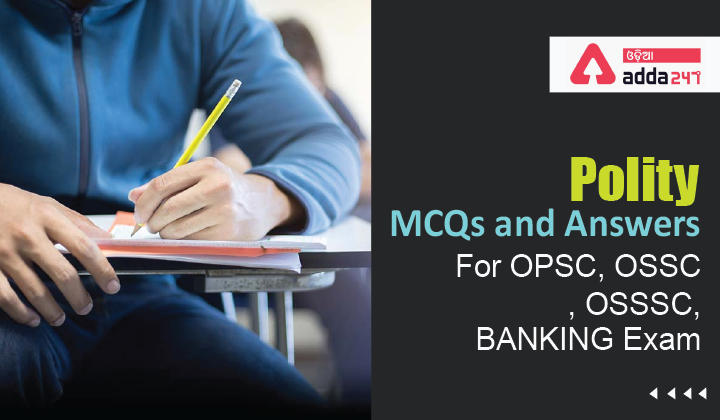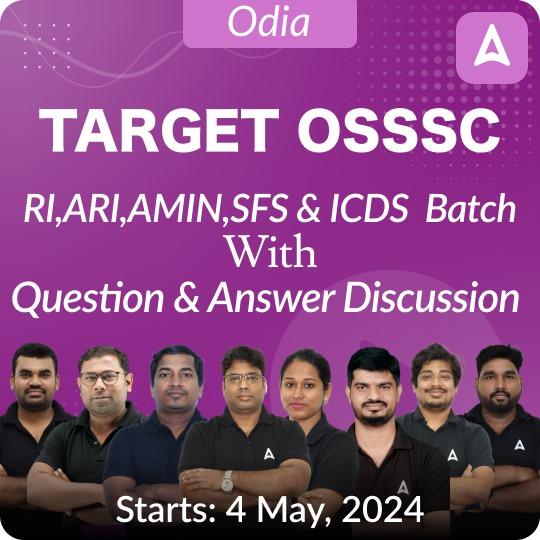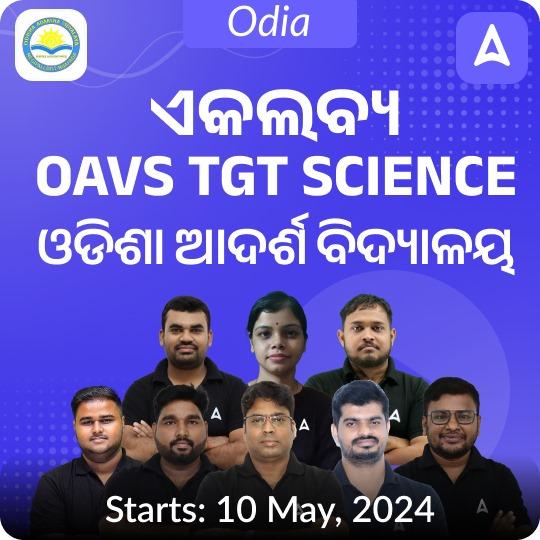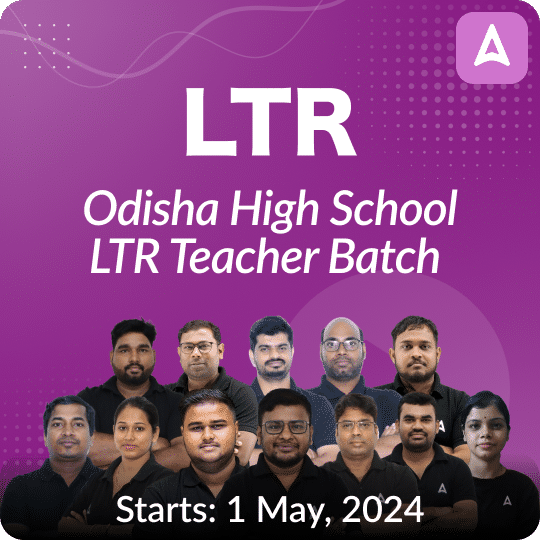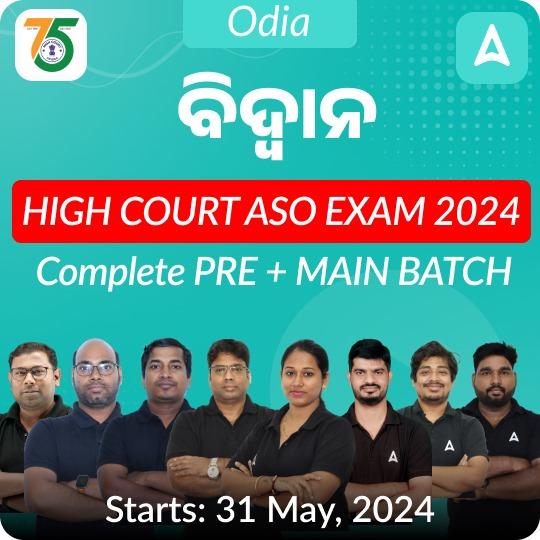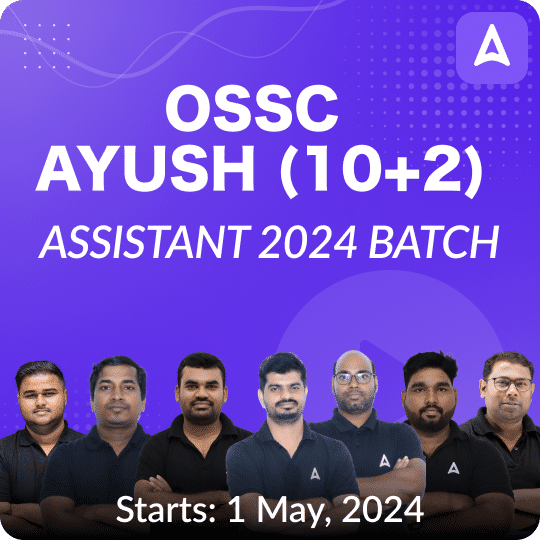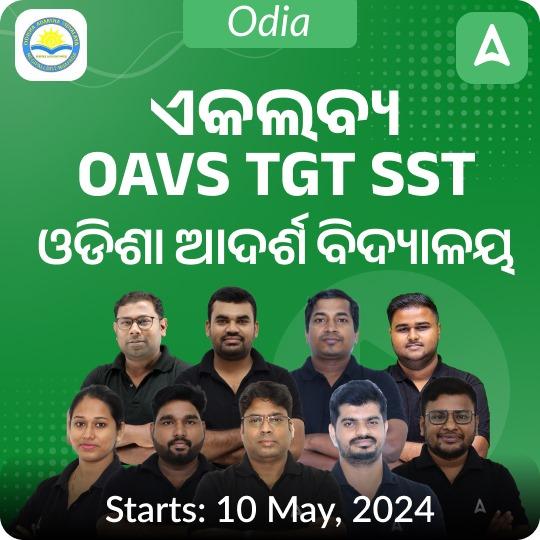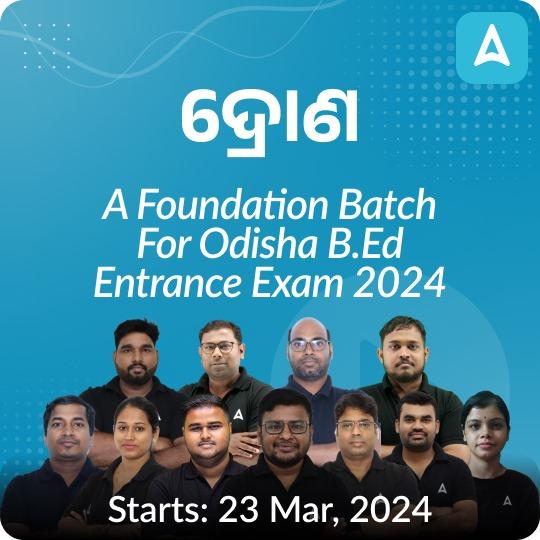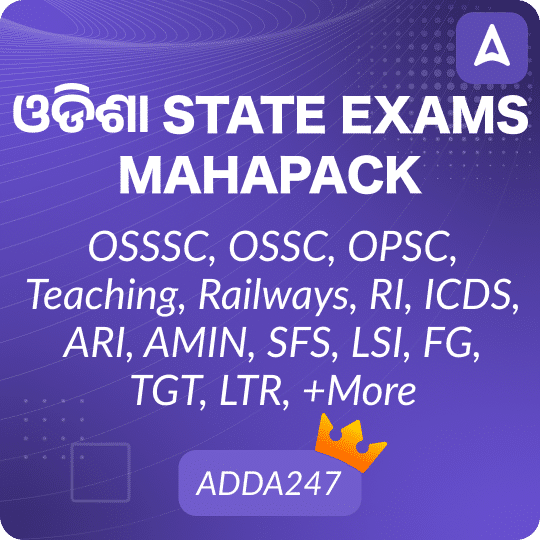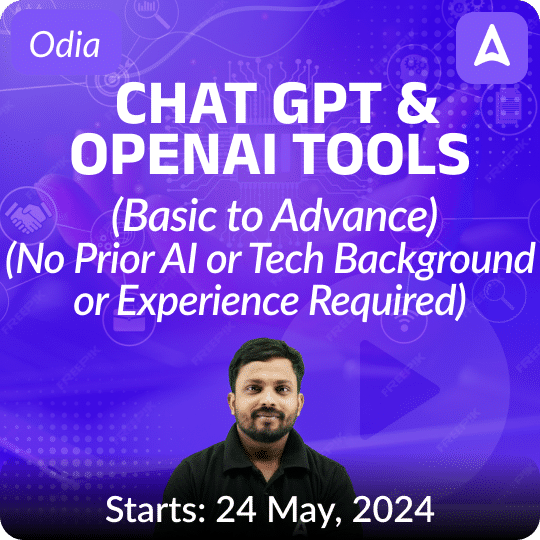Polity MCQs and Answers: Polity MCQs are very important for OPSC, OSSC, OSSSC & Other State Exams. Aspirants who are willing to apply for the various Government exams 2022 must go through the topics of Polity for competitive exams, as Polity is a key part of the syllabus.
Download ADDA247 Odia APP – Appear Latest Exam Test Series & Live Classes
Q1. Which is not a type of writ?
(a) Mandamus
(b) Magna Carta
(c) Habeas corpus
(d) Quo warranto
Q2. Which one of the following Articles was termed as the ‘Heart and Soul of the Constitution’ by Dr. B.R. Ambedkar?
(a) Article 14
(b) Article 25
(c) Article 29
(d) Article 32
Q3. The second most senior office in the country is of _____ .
(a) Office of the President of India
(b) Office of the Prime Minister of India
(c) Office of the Vice President of India
(d) Office of the Chief Justice of India
Q4. Article 187 of the Indian Constitution “Secretariat of State Legislature” deals with?
(a) the State Government
(b) the directive principles of state policy
(c) the Union Government
(d) the fundamental rights of the Indian Citizen
Q5. The Finance Commission in India is appointed by
(a) President of India
(b) Prime Minister of India
(c) Chairman of Rajya Sabha
(d) Speaker of Lok Sabha
Q6. The President of India is elected by an Electoral College consisting of
(a) Members of Parliament and State Legislature
(b) Elected members of Parliament and elected members of the State Legislative Assemblies
(c) Elected members of Lok Sabha and Rajya Sabha and State Legislative Assemblies
(d) None of the above
Q7. Permanent members of U. N. Security Council are
(a) U.K., U.S.A., Russia, China, Japan
(b) U.S.A., France, U.K., Russia, Canada
(c) U.S.A., France, China, U.K., Canada
(d) U.S.A., U.K., France, Russia, China
Q8. Which body functions instead of Panchayat in Manipur and Nagaland?
(a) Autonomous district council
(b) Special area development board
(c) Local development board
(d) District Council
Q9. Provisions related to Languages has been mentioned in which schedule of the Indian Constitution
(a) Sixth Schedule
(b) Seventh Schedule
(c) Eight Schedule
(d) Ninth Schedule
Q10. Who was the Chairman of the Union Constitution Committee of the Constituent Assembly?
(a) Dr. B. R. Ambedkar
(b) Pt. Jawaharlal Nehru
(c) Dr. Rajendra Prasad
(d) Sardar Patel
Q11. Which one of the following is not a fundamental right?
(a) Right to Freedom
(b) Right to Equality
(c) Right to Property
(d) Right Against Exploitation
Q12. The one rupee Indian note bears the signature of (a) Governor, Reserve Bank of India
(b) Secretary, Ministry of Finance
(c) Finance Minister
(d) None of the above
Q13. Which of the following Articles of the Indian Constitution guarantees equality of opportunity to all citizens of India in matters relating to public employment?
(a) Article 15
(b) Article 16(1) and 16(2) (c) Article 16(3)
(d) Article 16(3), (4) and (5)
Q14.The convention that “once a speaker always a speaker” is followed in-
(a) UK
(b) USA
(c) France
(d) India
Q15.From where did India adopted the federal system with a strong centre?
(a) United States of America
(b) Canada
(c) United Kingdom
(d) France

ANSWER
S1. Ans.(b)
Sol. The Indian Constitution broadly provides for five kinds of writs, habeas corpus, certiorari, mandamus, quowarranto and prohibition.
Magna Carts is not a writ. It is a type of royal charter.
S2. Ans.(d)
Sol. Article 32 was termed as the ‘Heart and Soul of the Constitution’ by Dr. B.R. Ambedkar.
Article 32 provides a guaranteed remedy, in the form of a Fundamental Right itself, for enforcement of all the other Fundamental Rights.
S3. Ans.(c)
Sol.
Vice President of India is the second highest constitutional office in India.
S4. Ans.(a)
S5. Ans.(a)
Sol.The Finance Commissions are commissions periodically constituted by the President of India under Article280 of the Indian Constitution to define the financial relations between the central government of India and the individual state governments.
S6. Ans.(c)
Sol. There is no direct election for the Indian Presidentis conducted in India.
He is elected by an electoral college, which consists of
Elected members ofLok Sabha and Rajya Sabha, elected members of Legislative Assemblies of the states (Legislative Councils have no role) and elected members of Legislative Assemblies of the Union Territories of Delhi and Puducherry.
S7. Ans.(d)
Sol. The permanent members of the United Nations Security Council also known as the Permanent Five, Big Five, or P5are the five sovereign states to whom the UN Charter of 1945 grants a permanent seat on the UN Security Council.
These states are – China, France, Russia, the United Kingdom, and the United States.
S8. Ans.(a)
Sol.The States of Meghalaya, Mizoram and Nagaland, areas covered under the Sixth Schedule.
The hill areas of Manipur and the district level Panchayats in the hill areas of Darjeeling.
Various kinds of grassroots local governance structures exist in these areas.
These local governance structures are known as Autonomous District Council.
S9. Ans.(c)
Sol.The Eighth Schedule of the Constitution of India lists the official languages of the Republic of India.
The eighth schedule includes 22 languages, as official languages.
S10. Ans.(b)
Sol. Jawaharlal Nehru was the Chairman of the Union Constitution Committee of the Constituent Assembly.
S11. Ans.(c)
Sol. Right to property is not a fundamental right , under Indian Constitution.
Earlier, it was a part of fundamental right but by 44th Amendment Act, 1978, it was made a legal right Under Article 300A.
S12. Ans.(b)
Sol.Currently,the Indian 1-rupee note (₹1) is the smallest Indian banknote in circulation and the only one being issued by the Government of India.
All other banknotes in circulation are issued by the Reserve Bank of India.
As a result, the one rupee note is the only note bearing the signature of the Finance Secretary and not the Governor of the RBI.
S13. Ans.(b)
Sol.Article16{Article 16(1) and (2)}guarantees equality of opportunity in matters of public employment and prevents the State from discriminating against anyone in matters of employment on the grounds only of religion, race, caste, sex, descent, place of birth, place of residence or income.
S14.Ans.(a)
Sol. In UK once elected, a Speaker continues in office until the dissolution of Parliament, unless he or she resigns prior to this. Customarily, the House re-elects Speakers who desire to continue in office for more than one term.
S15.Ans.(b)
Sol. The Federal System with Strong Centre has been borrowed by the Indian Constitution from Canada.

